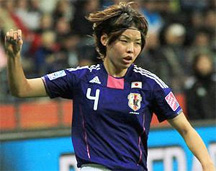TOKYO, (Reuters) – Named after a frilly pink flower, Japan’s World Cup-winning women’s soccer team embodied the iron-willed spirit of a nation united in its battle to recover from disaster.

When Saki Kumagai smashed the ball high into the net to complete a nail-biting penalty shootout victory over the United States in Frankfurt, bars and clubs across Tokyo exploded with cheers as fans celebrated a first world title for an Asian side.
“They just demonstrated Japan’s tenacity,” 41-year-old soccer fan Kazuhiro Teramoto told Reuters with the sun already peeping over the rooftops on a holiday yesterday.
“Fighting back again and again. They were fantastic.”
Japan’s “Nadeshiko” — named after a delicate pink carnation — twice came from behind against the more powerful Americans to take the final to penalties.
“My girls played their hearts out,” Japan coach Norio Sasaki told Japanese morning television, fighting back tears.
“We could really feel the power from everyone in Japan watching on TV. I’m stunned.”
Japan’s astonishing run in Germany has given the country a real lift after the devastating earthquake and tsunami which struck the north-east on March 11.
Amid fears of radiation after the giant tsunami wave triggered a nuclear meltdown at a power plant 150 miles north of Tokyo, and with thousands still living in shelters, Japan’s victory was as emotional as it was unexpected.
“I felt the whole of Japan smile,” the tearful mother of Japan captain Homare Sawa told Fuji Television.
Sawa’s audacious flick forced extra time, and brought her the Golden Boot for her fifth goal of the tournament, before it was left to the pint-sized Kumagai to finish the job.
“I’m amazed,” said Kumagai after her winning kick in the shootout. “I just smacked it as hard as I could.”
Japan’s petite musketeers, at an average height of 1.62m, seven centimetres shorter than the muscular Americans, unfurled a banner after being showered in confetti.
It read: “To our friends around the world – thank you for your support.”
HIGHER POWER
American goalkeeper Hope Solo said of Japan’s victory: “I truly believe that something bigger was pulling for this team.”
Sasaki had used images of the disaster to help motivate Japan’s players before shock victories over champions and hosts Germany and Sweden in the previous two games.
Karina Maruyama, who once worked for Tokyo Electric Power, operator of the crippled nuclear plant, had come off the bench to score the extra-time winner against Germany in the quarter-finals, underlining Japan’s steely determination.
“Every time Japan got knocked down, they got to their feet again,” 36-year-old florist Akiko Shirai told Reuters after partying through the night.
“They did not want to stop fighting for the disaster victims.”
Another reveller, 38-year-old office worker Aki Miyajima, also praised Japan’s never-say-die spirit.
“Japan had to defend for so long. The Americans were so big they were like a wall,” she said. “But Japan won by willpower — Japanese-style!”
Sawa, voted the tournament’s MVP, cradled her gold medal.
“I can’t believe it,” the scorer of 80 goals in 173 games for her country and a veteran of five World Cups told Japanese television.
“We have the gold medal because we never stopped fighting and believing in ourselves.”
Japan’s women can expect a ticker-tape welcome on their return, having captured the hearts of a public trying to put a brave face on frequent earthquake aftershocks and radiation fears.
“The goalkeeper (Ayumi Kaihori) summed up Japan up for me,” said 37-year-old banker Naoki Tsuchiya. “So small but she saved two penalties in the shootout.
“The way she gritted her teeth and pumped her fists. Those pictures on TV will give people energy and hope.”
Kaihori herself confessed to feeling she was in a dreamworld.
“I allowed two goals in the match so I put my heart into the shootout,” she said. “It hasn’t sunk in. This stuff only happens on TV.”
